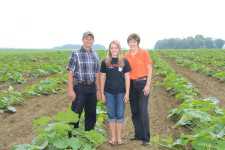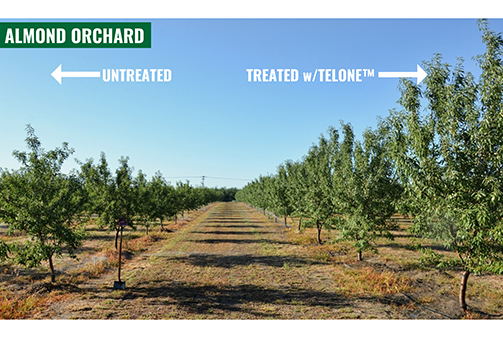Potato Grower Ensures Success By Adding Agritainment Component

Today, adapting to the needs of your market is a necessity if you want to stay competitive, and Ramseyer Farms, a fifth generation 720-acre farm located in Wooster, OH, has done precisely that. Having evolved from focusing on growing fresh market potatoes to chipping potatoes to the current business model, which includes potatoes, pumpkins, and a robust agritainment component, Ramseyer Farms is no stranger to change.Â
The farm’s story began in 1880 with current owner Dennis Ramseyer’s great grandfather, Daniel Ramseyer, growing a number of different crops. The next generation of Ramseyers focused primarily on potatoes, and transitioned to chipping potatoes when they noticed the potato chip industry taking off in the ’40s and ’50s.Â
Fast forward to today, and the bulk of Ramseyers’ potatoes are for the chipping industry, but the farm still maintains 10 of its 220 acres of potatoes for retail, which they sell onsite to the public in the fall.
In addition to the acreage dedicated to potatoes and pumpkins, Ramseyer Farms also produces wheat, corn, and soybeans. Perhaps one of the most alluring sides of the business, however, is the portion that attracts hundreds of visitors to the farm each year: the 35 acres of land devoted to agritainment. This area of the operation includes two 8-acre corn mazes, a U-pick pumpkin patch, forested areas for hayrides, and space for dozens of activities designed for all ages.
Evolving With The Market
After talking with the farm’s owners, Dennis and Karen Ramseyer, it’s apparent that the farm’s spirit of reinvention and its tendency to zero in on opportunities has set it apart from other potato growers in the area. When some area farms were struggling after being dropped by a major chip retailer because of increasingly rigid quality standards, Dennis was going door to door to smaller chip plants to sniff out suppliers.
“I actually went and visited most of the chip plants that were in a 500-mile radius of us at that time, and was able to develop markets. I saw the problem that we had dealing with a large chipping company, and so I stayed away from larger companies and started dealing with the smaller companies that I could talk with one on one,� he remembers. As a result of those efforts, he says Ramseyer Farms is the only farm left in the area growing potatoes.
Agritainment Begins
In addition to the changes the Ramseyers made re-adapting to the potato market, Dennis says he realized about 20 years ago that the farm needed to diversify its offerings and he began to sell pumpkins on the side with their retail potatoes.
“Back in the late ’90s grain prices were not that good, and we were saying, ‘If we’re going to continue to live here on the farm we have to be innovative and do some other things to make a living,’� he states.
During that time Dennis’ wife Karen, then a school nurse, brought their Sunday school class back to the farm and took them on a hayride which set the train of thought in motion. After that day it was clear to the couple that they wanted to share with the public the lifestyle and atmosphere they so often took for granted.
“I thought maybe we could do some kind of entertainment to help educate students through field trips, tell them about the farm and how potatoes and pumpkins are raised, and what products are made from these crops. On the weekends we could invite the public onto our farm; maybe let them walk through a corn maze and give them a hayride through the woods.�
Dennis also mentions that two or three generations back, many people had at least one relative engaged in some type of farming, and therefore had a chance to visit a farm to experience the farming lifestyle. Now, according to government agricultural statistics, less than 2% of Americans are engaged in farming, so operations like the Ramseyers’ provide the public with an opportunity to see the lifestyle and connect with it while getting a better idea of where their food comes from.
Over time, the Ramseyers have gotten creative with the activities they set up, and spend a considerable amount of time and effort each year designing new attractions to draw more visitors. One of the ways the couple sources ideas is by attending the North American Farmers’ Direct Marketing Association (NAFDMA) Convention, which is held annually in different areas of North America. The convention includes a bus tour to similar operations, networking opportunities, as well as workshops and concurrent sessions from industry experts. They’re also sure to take the public’s suggestions into consideration by way of an exit survey they administer to guests.
Furthermore, having both grown up on farms, Karen and Dennis draw on their childhood experiences in the field to re-create some of their fondest memories for visitors to experience when they visit the farm.
“We try to think of things that we enjoyed doing on the farm when we were kids and incorporate that into our activities,� recalls Dennis. “We used to play in wheat trucks when I was a kid when they were out in the field loading, so we made a pit of shelled corn for kids to play and jump in. We also used to make tunnels with bales of straw in the barn that we used to crawl through, and now in the new mountain we’ve made (see above photo), we’ve got tunnels the kids can crawl through to kind of give them that feel,� he explains.
Not A Typical Operation
One of the things the Ramseyers say sets them apart from other similar operations is that they’re a fully operational farm. In contrast, they say a number of ag-entertainment farms are either not producing crops or they are run by weekend farmers. Additionally, all of the Ramseyers’ income is generated from the farm, and for that reason they’re careful not to cut any corners, ensuring safety and creating a comforting home-like environment for all their guests.
The busiest time of year for the agritainment portion of the operation is typically near the end of September and through October. During this time the Ramseyers say they lead approximately 20 to 30 school tours during the week.They have about 20,000 visitors come through over the course of five weekends, and employ up to 30 additional people to manage activities. However, Karen says that at the rate business is increasing they may need even more helping hands down the line.
As far as future generations taking the reins, the couple doesn’t want to pressure their four daughters into anything, but would be happy if any of them returned to the farm and joined the operation. Dennis and Karen say they try to include the girls when making decisions, and that their daughters definitely have a love for the farm and want to see it succeed.
Ramseyer Farms is a classic example of how optimism and good faith can yield results. Instead of conceding defeat to the markets they saw in decline, they focused their efforts on seeking out alternative options to remain a key market player, and if their current business model is any proof, they’ve been quite successful in doing so.
Â
Â









